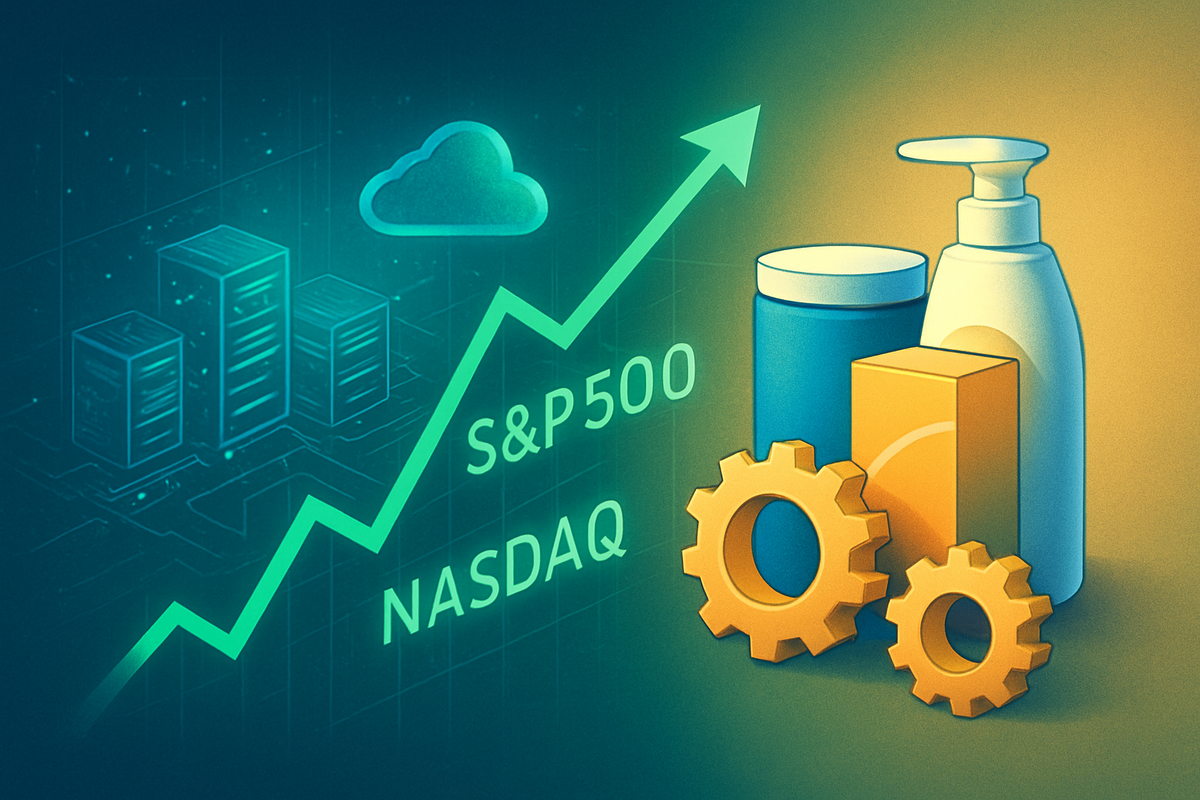Tech Titans Unite and Consumer Giants Merge: Amazon-OpenAI Partnership and Kenvue Buyout Ignite S&P 500 and Nasdaq Gains

November 3, 2025 – The U.S. stock markets are experiencing a significant surge today, with both the S&P 500 and Nasdaq Composite pushing towards new highs. This bullish sentiment is largely fueled by two monumental corporate announcements: a strategic $38 billion partnership between Amazon Web Services (AWS) and OpenAI, and a massive $48.7 billion acquisition of Kenvue by Kimberly-Clark Corporation. These developments signal profound shifts in the technology and consumer goods sectors, driving investor optimism and reshaping competitive landscapes.
The Amazon-OpenAI collaboration underscores the insatiable demand for advanced computing power in the artificial intelligence (AI) race, solidifying AWS's position as a critical enabler for frontier AI development. Simultaneously, the Kenvue buyout represents a major consolidation in the consumer health market, aiming to create a dominant global player with an expanded portfolio of iconic brands. Together, these events are injecting fresh momentum into the markets, highlighting strategic realignments that promise long-term implications for industries and investors alike.
Landmark Deals Reshape Tech and Consumer Landscapes
The first Monday of November 2025 has delivered a flurry of corporate activity that is sending ripple effects across global markets. Two distinct but equally impactful events have captured headlines: a colossal strategic alliance between Amazon (NASDAQ: AMZN) and OpenAI, and a definitive acquisition of Kenvue (NYSE: KVUE) by Kimberly-Clark Corporation (NYSE: KMB).
The Amazon-OpenAI partnership, announced today, is a seven-year, $38 billion strategic agreement that will see OpenAI leverage Amazon Web Services' (AWS) cloud infrastructure to power its advanced AI workloads. This includes immediate access to hundreds of thousands of cutting-edge Nvidia (NASDAQ: NVDA) GB200 and GB300 GPUs hosted on Amazon EC2 UltraServers, with the flexibility to scale to tens of millions of CPUs. This move is a significant strategic pivot for OpenAI, diversifying its cloud compute resources beyond its previous primary reliance on Microsoft Azure, following a recent amendment to its partnership with Microsoft (NASDAQ: MSFT). OpenAI CEO Sam Altman emphasized the critical need for "massive, reliable compute" to scale frontier AI. For Amazon, the deal is a major validation of AWS's capabilities and strengthens its position in the fiercely competitive AI infrastructure market, which is seeing Amazon commit over $100 billion in AI infrastructure investments in 2025.
Concurrently, Kimberly-Clark announced its agreement to acquire Kenvue in a cash and stock transaction valued at approximately $48.7 billion. Kenvue shareholders are set to receive $3.50 in cash and 0.14625 shares of Kimberly-Clark stock per share, representing a substantial 46.2% premium over Kenvue's closing price on October 31, 2025. This acquisition, expected to close in the second half of 2026, will merge Kimberly-Clark's personal care brands like Huggies and Kleenex with Kenvue's consumer health portfolio, which includes household names such as Tylenol, Aveeno, Band-Aid, Listerine, and Neutrogena. The combined entity is projected to generate around $32 billion in annual net revenues and $7 billion in adjusted EBITDA for 2025, with Kimberly-Clark anticipating approximately $2.1 billion in annual cost savings from synergies. This acquisition follows a challenging period for Kenvue since its 2023 spin-off from Johnson & Johnson (NYSE: JNJ), marked by leadership changes, stock declines, and ongoing legal battles concerning its Tylenol and talcum powder products.
Initial market reactions have been swift and decisive. Amazon's shares surged between 5% and 5.4% in premarket and early trading, while Nvidia also saw a nearly 2.9% increase. Conversely, Microsoft shares briefly dipped on the news, reflecting the end of its exclusive cloud provider status for OpenAI. In the consumer sector, Kenvue's stock experienced a dramatic jump of 15% to 20%, driven by the significant premium offered. Kimberly-Clark's stock, however, declined by 12.5% to 16%, as investors reacted to the substantial investment and potential short-term financial pressures of the acquisition. These market movements underscore the immediate impact of these strategic decisions on investor sentiment and corporate valuations.
Corporate Fortunes: Winners and Losers in the Wake of Major Deals
The ripple effects of these two monumental announcements are poised to redefine corporate fortunes across the technology and consumer goods sectors, creating clear winners and losers.
In the wake of the Amazon-OpenAI partnership, Amazon (NASDAQ: AMZN) emerges as a significant winner. The $38 billion, seven-year deal is a massive revenue generator for Amazon Web Services, bolstering its position as a dominant force in cloud computing and a critical enabler of AI innovation. This partnership not only validates AWS's extensive infrastructure investments but also strengthens Amazon's overall AI strategy, which includes its deep commitment to Anthropic and the development of custom AI chips. Nvidia (NASDAQ: NVDA) is another clear beneficiary, as the deal hinges on OpenAI's access to hundreds of thousands of its high-performance GB200 and GB300 GPUs. This further solidifies Nvidia's indispensable role as the leading hardware provider for the AI industry, driving continued demand for its cutting-edge processors. Other AI chip manufacturers like AMD (NASDAQ: AMD) and Broadcom (NASDAQ: AVGO) may also see indirect benefits from the overall surge in AI infrastructure spending, as OpenAI has reportedly engaged with them for custom AI accelerators.
Conversely, Microsoft (NASDAQ: MSFT) faces a nuanced situation. While it retains a significant financial and strategic relationship with OpenAI, including a separate $250 billion commitment for Azure services, the Amazon deal formally ends Microsoft's exclusivity as OpenAI's primary cloud provider. This shift means Microsoft loses a singular competitive advantage in hosting OpenAI's foundational AI workloads, potentially impacting its perception as the exclusive AI cloud partner. Other cloud providers like Google Cloud (NASDAQ: GOOGL, GOOG) and Oracle (NYSE: ORCL), despite having smaller existing agreements with OpenAI, will find the competition for large-scale AI workloads even more intense, potentially limiting their opportunities to significantly expand their share of OpenAI's demanding compute needs.
For the Kenvue buyout, Kenvue (NYSE: KVUE) shareholders are the immediate winners, seeing their stock surge by over 17% due to the substantial 46.2% premium offered by Kimberly-Clark. This provides a lucrative exit for shareholders after a period of market struggles and controversies for the consumer health company. Kimberly-Clark (NYSE: KMB), despite an initial stock dip, is positioned for long-term strategic gains. The acquisition significantly expands its portfolio with iconic consumer health brands like Tylenol and Neutrogena, creating a combined entity with projected annual revenues of $32 billion and anticipated annual cost synergies of $2.1 billion. This strategic move aims to transform Kimberly-Clark into a global health and wellness leader, enhancing its competitive edge and driving future profitability.
However, Kimberly-Clark (NYSE: KMB) faces short-term challenges. Its stock tumbled by approximately 12% to 14% immediately after the announcement, reflecting investor concerns over the hefty acquisition cost, potential share dilution, and the inherent risks associated with integrating two large companies. Kimberly-Clark will also inherit Kenvue's significant legal liabilities, including ongoing lawsuits related to its talcum powder and widely debated claims linking Tylenol to autism. This could pose substantial financial and reputational risks. Competitors in consumer health, such as Procter & Gamble (NYSE: PG), Unilever (NYSE: UL), GSK Consumer Healthcare (LSE: GSK), and Colgate-Palmolive (NYSE: CL), may find themselves facing intensified market competition. The combined scale and diversified portfolio of Kimberly-Clark and Kenvue could lead to increased pressure on market share and pricing, potentially triggering further consolidation or strategic adjustments within the industry.
Broader Significance: Industry Transformation and Regulatory Scrutiny
These two distinct, multi-billion dollar transactions are not isolated incidents but rather powerful indicators of broader, transformative trends sweeping across the technology and consumer goods sectors. Their wider significance extends to reshaping industry structures, influencing competitive dynamics, and potentially attracting heightened regulatory attention.
The Amazon-OpenAI partnership squarely fits into the accelerating "AI race" and the "cloud compute wars." It underscores the astronomical demand for specialized computing power, particularly GPUs, required to train and deploy advanced AI models. OpenAI's decision to diversify its cloud infrastructure beyond its primary relationship with Microsoft Azure signals a growing trend among leading AI innovators to adopt multi-cloud strategies. This move aims to mitigate risks associated with single-vendor reliance, ensure access to diverse hardware, and optimize for cost and performance. This strategic alliance also reflects a broader pattern of tech giants forming "killer collaborations" with AI startups, offering essential infrastructure in exchange for market influence and a stake in the future of AI. The sheer scale of the $38 billion deal highlights how foundational cloud infrastructure has become to the development of frontier AI, pushing providers like AWS to continuously invest massive capital into data centers and advanced hardware.
The Kenvue buyout by Kimberly-Clark, conversely, exemplifies the ongoing wave of consolidation within the consumer healthcare and consumer packaged goods (CPG) industries. Companies are aggressively pursuing mergers and acquisitions to achieve economies of scale, gain market share, and optimize their brand portfolios in a competitive landscape. This deal also aligns with a corporate strategy of portfolio reshaping, following Johnson & Johnson's spin-off of Kenvue to focus on its core pharmaceutical and medical devices businesses. Kimberly-Clark's acquisition is a strategic adaptation to create a stronger, more diversified player in the growing health and wellness market, which is driven by evolving consumer preferences. This move could trigger a ripple effect, prompting other major CPG and consumer health players like Procter & Gamble (NYSE: PG) or Unilever (NYSE: UL) to consider their own strategic acquisitions or divestitures to maintain competitive parity.
Both transactions carry significant regulatory and policy implications. The Amazon-OpenAI deal, given its scale and impact on critical AI infrastructure, is likely to draw intense antitrust scrutiny from regulators globally. Concerns will center on market concentration in AI and cloud computing, potential barriers to entry for smaller AI startups, and whether such collaborations could stifle competition. Regulators are increasingly wary of "killer collaborations" that might achieve similar anti-competitive effects as outright acquisitions. Similarly, the Kenvue buyout will face rigorous antitrust review due to the consolidation of major brands in the consumer health and personal care markets. Authorities will examine the impact on consumer choice, pricing, and overall market competition. Furthermore, Kenvue's history of product-related lawsuits and controversies, particularly those surrounding Tylenol and talcum powder, could lead to heightened regulatory oversight on product safety and marketing claims for the combined entity.
Historically, the Amazon-OpenAI partnership echoes the intense "cloud wars" of the past decade and early strategic alliances in nascent tech sectors that shaped industry standards and market leadership. It also directly follows Microsoft's earlier, multi-billion dollar investment in OpenAI, demonstrating an evolution of strategic partnerships in the AI space. The Kenvue buyout can be compared to other significant consolidations in the consumer health sector, such as Pfizer's consumer health division being acquired by GSK (which later spun off as Haleon), or Merck's consumer health unit going to Bayer. These historical precedents highlight the recurring industry drive for scale, efficiency, and brand diversification through M&A, often following corporate spin-offs.
The Road Ahead: Opportunities, Challenges, and Strategic Pivots
Looking ahead, both the Amazon-OpenAI partnership and the Kenvue buyout are set to unfold with a mix of opportunities, challenges, and strategic imperatives that will shape their respective industries for years to come.
For the Amazon-OpenAI partnership, the short-term focus will be on the seamless and rapid scaling of OpenAI's AI workloads on AWS's infrastructure. This immediate access to hundreds of thousands of Nvidia (NASDAQ: NVDA) GPUs and millions of CPUs is critical for OpenAI's ongoing development and deployment of advanced models like ChatGPT. For Amazon (NASDAQ: AMZN), this deal validates its massive investments in AI infrastructure and positions AWS as a leading enabler for frontier AI. Long-term, the partnership could evolve into deeper integration and joint innovation, with AWS potentially offering specialized services optimized for OpenAI's models, further influencing the broader AI ecosystem. This collaboration intensifies the "compute wars," pushing other cloud providers like Microsoft (NASDAQ: MSFT) and Google (NASDAQ: GOOGL, GOOG) to bolster their own AI offerings and partnerships, or accelerate custom AI chip development. Opportunities include increased demand for AWS's AI services and accelerated innovation in AI applications. Challenges, however, include potential capacity constraints for AWS amidst surging AI demand and intensifying competition, alongside ongoing regulatory scrutiny regarding market concentration. An optimistic scenario sees the partnership driving unprecedented AI advancements and AWS solidifying its leadership, while a challenging scenario could involve technical hurdles or unforeseen competitive pressures.
The Kenvue buyout by Kimberly-Clark (NYSE: KMB) faces immediate hurdles centered on securing necessary regulatory and shareholder approvals, with the transaction expected to close in the second half of 2026. Kimberly-Clark will then embark on the complex process of integrating Kenvue's (NYSE: KVUE) operations, brands, and workforce. A key short-term strategic pivot will be to address Kenvue's recent challenges, including legal liabilities related to Tylenol and talcum powder, and stabilizing brand perception. Long-term, the merger aims to create a global consumer health powerhouse with combined annual revenues of $32 billion, realizing approximately $2.1 billion in annual cost synergies. This scale is intended to enhance market positioning against rivals like Procter & Gamble (NYSE: PG) and drive innovation. Market opportunities include enhanced market share, increased R&D investment, and geographic expansion. However, significant challenges loom, including substantial integration risks, the financial impact of new debt, and the inheritance of Kenvue's ongoing legal and regulatory scrutiny. A successful integration scenario would see Kimberly-Clark effectively leverage the combined portfolio, achieving synergies and becoming a highly profitable leader. Conversely, a challenged integration could lead to underperformance and negative investor sentiment for Kimberly-Clark.
A New Era: Market Assessment and Investor Watch Points
The events of November 3, 2025, mark a pivotal moment for both the technology and consumer goods sectors, signaling a new era of strategic alliances and market consolidation that will have a lasting impact on the global economy.
The Amazon-OpenAI partnership is a clear affirmation of AI's central role in future economic growth and technological advancement. It underscores the critical importance of cloud infrastructure as the backbone of AI development, creating an "arms race" for compute power among tech giants. For the market moving forward, this means continued heavy investment in data centers, specialized AI hardware (like Nvidia GPUs and custom chips), and strategic partnerships will remain paramount. The deal also highlights the increasing trend of AI companies diversifying their cloud dependencies, fostering a more competitive and resilient ecosystem. The lasting impact will be a further acceleration of AI innovation, with the potential for groundbreaking applications across industries, solidifying AWS's position as a dominant force in the AI infrastructure landscape.
The Kenvue buyout represents a significant consolidation in the consumer health sector, driven by the pursuit of scale, brand diversification, and operational efficiencies. Kimberly-Clark's strategic move to integrate iconic brands like Tylenol and Neutrogena into its portfolio aims to create a formidable global health and wellness leader. This deal reflects the ongoing pressure on CPG companies to optimize their portfolios, shed non-core assets, and acquire strong brands to drive growth in a competitive environment. The lasting impact will be a reshaping of the consumer health competitive landscape, potentially prompting further M&A activity among rivals and a renewed focus on innovation and brand strength within the newly formed entity. The successful integration of Kenvue's diverse brands and the effective management of its inherited legal challenges will be crucial for Kimberly-Clark's long-term success.
What Investors Should Watch For in Coming Months: Investors should closely monitor several key indicators. For the Amazon-OpenAI partnership, observe AWS's revenue growth driven by AI workloads, the competitive dynamics between Nvidia's GPUs and proprietary AI chips, and any further strategic alliances in the AI space. The progress of OpenAI's model development on AWS infrastructure will also be a critical barometer. For the Kenvue buyout, attention should be paid to the timely completion of the acquisition, successful navigation of regulatory approvals, and the initial phases of integration. The realization of projected cost synergies and Kimberly-Clark's strategy for addressing Kenvue's ongoing legal liabilities (particularly the Tylenol and talcum powder lawsuits) will be paramount. Both events underscore the dynamic nature of today's markets, where bold strategic moves by corporate titans continue to drive significant shifts and create both opportunities and challenges for investors.
This content is intended for informational purposes only and is not financial advice



